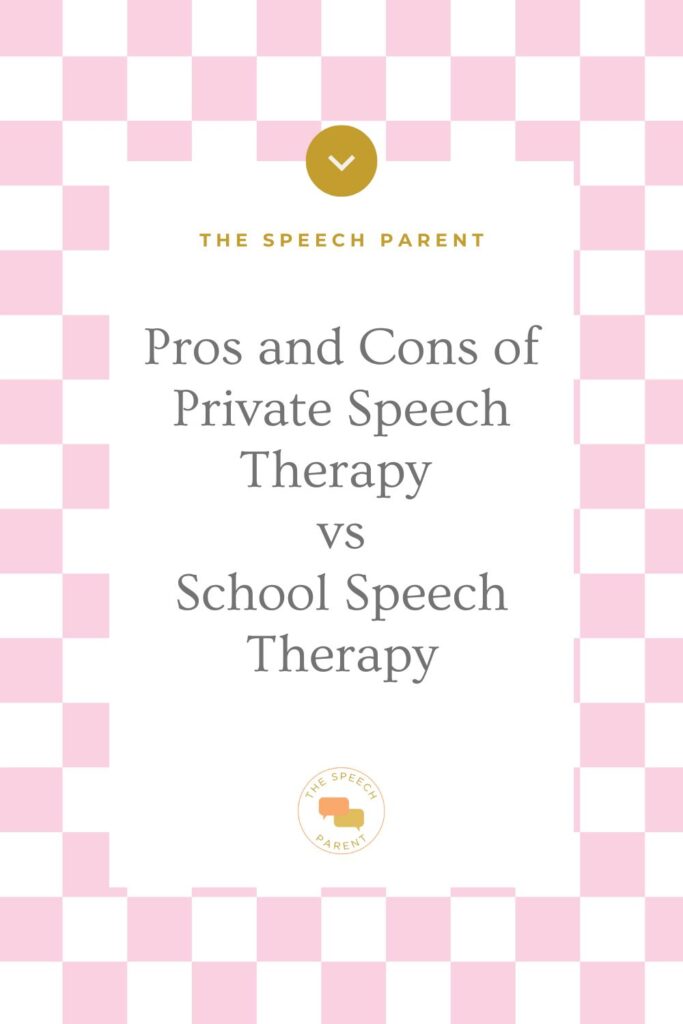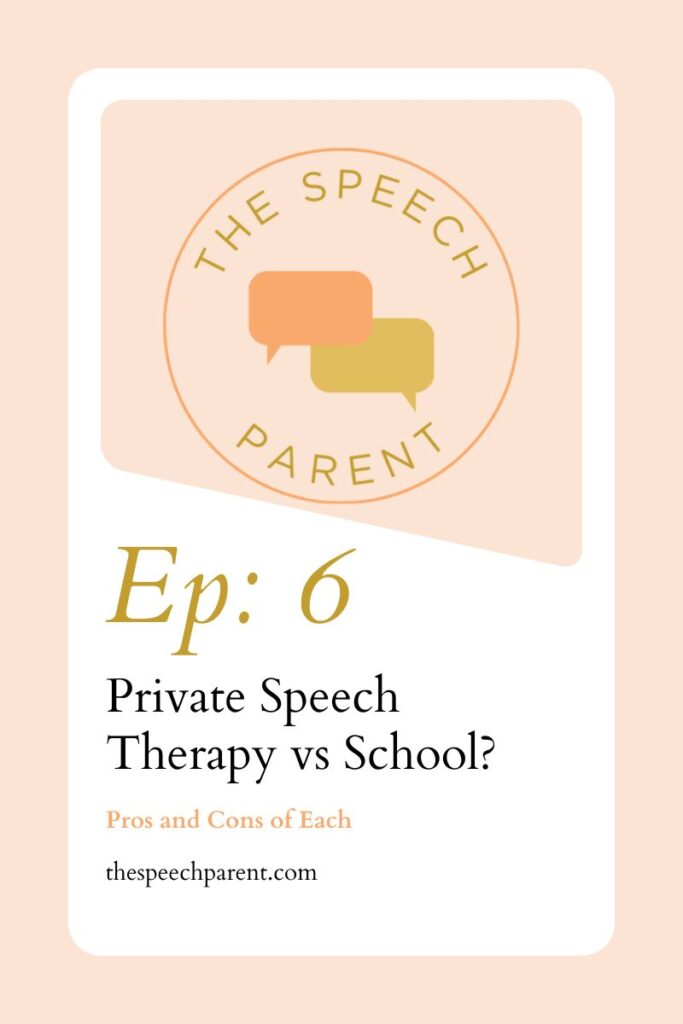Hello hello and welcome back to (reading) the 6th episode of The Speech Parent. Today we’re discussing private speech therapy vs school speech therapy. I’m Emily Bower, and I’m so glad you’re here. If you’re a parent (or caregiver) of a child with a speech language delay – like myself – then this blog/podcast is for YOU as an educational branch of The Speech Parent Community. You can find out more about our community by going to TheSpeechParent.com/community.
Now last week and this week we have been focusing on private speech therapy vs school speech therapy. Last week’s blog post discussed the medical model vs the school model which is in important distinction when you’re wondering why your kid doesn’t qualify in one setting or is eligible for less therapy minutes. Go back and read that blog post if you haven’t already, because this week we’re following it up with the pros and cons of private speech therapy vs school speech therapy.
School Based Therapy
So let’s kick it off with the question – what Exactly Are School Based SLP Services?
Great question. If you listened to earlier episodes then you know this, but school services are not just for public school students, nor are they only for school-age kids.
The Individuals with Disabilities Education Act (IDEA) was first passed in 1975 and it guarantees a free, appropriate public education to all students – including those with disabilities. That means that if your child meets eligibility criteria (I’ll explain later) then he/she can receive speech-language therapy through your local public school system.
What you may not know is that this applies to kids from birth to high school graduation or age 21 (whichever comes first)!
That means your little 2 year old can *potentially* receive government based early intervention services. And your sixteen-year-old can also receive services at his/her school!
Does your child go to a private school? The IDEA still covers them too! If your child needs speech-language services, then the need has to be met. Regardless of where they are or how old they are.
As an SLP, this makes me very, very happy! I believe that everyone should have access to therapies, and the younger we intervene the better!
Private Speech Therapy
Now -What Exactly are Private Clinic Based SLP Services?
It’s pretty much exactly what it sounds – private speech therapy. Your child will go to a private clinic (likely specializing in pediatric services) to receive speech-language therapy. Sometimes this is at a large facility that also offers physical and occupational therapy. Sometimes it may also offer a developmental preschool or other services. Or it may be an individual provider – possibly doing therapy out of his/her home or traveling to clients’ homes!
Typically, at a private clinic you or your insurance are paying for the speech therapy services. Also, your child will usually work one-on-one with the therapist compared to the school therapist that usually works with children in groups.
Pros For School Speech Therapy
Now let’s do the official compare/contrast –
PROS:
It’s free! Like completely.
It’s convenient – you child is already in school and the therapist comes to to the classroom to either pull them out or push in to provide services. You don’t have to transport them anywhere! (Unless not school-age, then it depends on how early intervention is set up your area)
It’s reliable! If your child’s therapist quits/moves/whatever, then the school system must continue providing services legally. They will move therapists around or hire someone else!
Your child’s teacher can know how to help – The majority of educators want to know everything they can to better serve their students. If the teachers know that your child has difficulties with xyz, then they can continue working on those concepts in the classroom.
Your child may get extra support or accommodations in the classroom – a child in the school system who receives speech-language therapy typically has an Individualized Education Program (IEP) and can potentially get accommodations such as extended time, text to speech, speech to text, small group testing, etc.
The school district may have a more lenient eligibility criteria than the insurance company – meaning that even though your child only has difficulty with correctly producing a couple sounds, he/she can still receive speech services even if test scores weren’t low enough to meet insurance standards. But this depends on the district!
Cons for School Based Therapy
CONS:
Typically not as much therapy time offered in the school compared to private speech therapy. Schools are closed for summer, winter break, spring break, and a multitude of other holidays in-between. Also there are professional development days and numerous school events or conferences that can conflict with therapy. I assure you that therapists are trying their best to see your child, but unfortunately, their hands are often tied with other obligations or school requirements.
Schools are known for an abundance of group therapy. Due to high caseloads and obligations/requirements referenced above, school based SLPs are often forced to group kids together – typically in groups of 4. Sometimes this is excellent and highly motivating for the children! They can learn from each other and practice valuable skills like turn-taking in a conversation. However, it still means less individualized attention, less repetitions during drill, etc.
Typically less parent involvement. Parents are required to attend the annual IEP conferences to discuss updates on their child’s progress/goals. And many SLPs send homework or ideas for continued practice with parents. However, they typically aren’t allowed to watch sessions or have lengthy training conversations/sessions with the therapist.
I don’t personally view this next one as a con. At the school where I work, tons of kids are pulled for different services and many students beg me to take them every day. But for a lot of parents, they don’t want their child labeled with an IEP or be in special education. I totally get that. There’s no hiding it if you get school based services, but you can try to hide it from teachers/peers with private therapy. **You should know that they probably already realize your child has difficulty with xyz and they probably don’t care. Everyone has something they need to work on. Acceptance and positive parent-talk are huge!**

Pros for Private Speech Therapy
PROS:
Individual therapy sessions mean that the SLP is totally focused on your child and his/her unique goals. It also means that the therapist is better able to customize the sessions to incorporate special interests or hobbies that your child enjoys.
Typically in private speech therapy they can offer longer sessions such as 120 minutes weekly (2 sessions of 60 minutes each) vs. 60 minutes weekly (2 sessions of 30 minutes each). However, this is only a pro if your child actually needs that much time. Many children will do exceptionally well with just 60 minutes weekly.
Typically you can watch sessions and receive coaching on how to continue working with your child at home. Instead of just getting a paper handout or a conversation once a year, you can talk to your child’s therapist multiple times a week to stay updated on progress and how you can help him/her at home.
Specialized SLPs! In the school setting, it is really hard to specialize because you are forced to treat whoever is put on your caseload. However, private clinics can accept/reject clients based on what kind of disorders the therapist actually wants to work with. Private SLPs may specialize in autism, speech-sound disorders, fluency, reading, etc. Obviously this is a huge plus for your child to be treated by someone who has invested extra education and years of experience into that one area.
Cons for Private Speech Therapy
CONS:
Can be costly, especially if your insurance doesn’t pay for it and you have to pay out of pocket.
Not as convenient – you have to drive them and figure it out with work/school schedules. This also means potentially missing out on some free time or extra-curricular activities that occur after school.
Some clinics have long wait lists, and depending on your area it may be hard to find the ideal therapist/clinic that you’re looking for.
You have to look out for scams. Private clinics/therapists, unlike schools, are trying to make a profit. Sadly, there are a lot of scams out there. Your child should only be seen for the amount that he/she actually needs – not more. You don’t want the clinic/therapist billing for unskilled work (aka your child simply playing and the therapist not interacting with him/her).
Every minute should count and be purposeful. (Caveat here – most therapy sessions will involve lots of play based interventions so play does not equal bad! It’s so so good if you see more play based interactions than drill work, especially with language/AAC/autism/cognition kids!)
So…What Should I do??
If you’re having a hard time deciding between private speech therapy or school based therapy, then my advice is to do both.
Should I Do Both?
At a young age, therapy is purposeful play time and good therapists will help prevent child burn out. Plus early intervention is crucial! For young kids, I would maximize services as much as you’re financially able to do so. If it was me and I had insurance that would pay for private, then I would try to do both.
However, I don’t always recommend both long term. If your child is older and has been in therapy for ages – check their motivation level. Do they hate it? Then they aren’t getting anything out of it = quit! If therapy sessions are getting in the way of valuable things you or them would rather do instead = quit!
Decide on your priorities and what really matters. Therapy is great, but it isn’t more important than the happiness and overall well being of your child!
And with that, I just want to remind you that you are an amazing parent. The fact that you’re here, learning and growing to help your kid do the same – incredible. Thank you for being the rockstar that your kid needs. I’m proud of you!
And if you’re needing more individualized help regarding your specific child, I’d love to talk it through with you! You can go to thespeechparent.com/coaching to sign up for a coaching call!
Thank you for your support of The Speech Parent podcast! I’m so glad you’re here. Don’t forget about our Facebook community that you can join by going to thespeechparent.com/community! We’d love for you to join, share your story, and celebrate your child with all of us speech parents. You are amazing.
